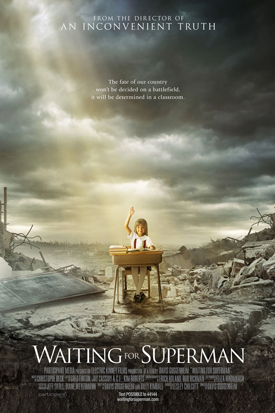
Anthony is a kid who genuinely wants to learn.
He might be a fifth-grader, but he surprises — and saddens — the audience of Waiting for Superman with the unexpectedly mature things that come out of his mouth.
“I want my kids to have better than I have,” he says toward the end of the movie.
Davis Guggenheim (An Inconvenient Truth) argues in his new documentary that adults divide children. He contends that all kids have the same potential for learning but for some, only a fraction of that potential is realized because of a crumbling education system.
In a documentary that relies heavily on pathos, Guggenheim points out the huge disparities of schools in America’s public school system. His film addresses the flaws that manifest themselves in shocking high school dropout rates in urban schools, teachers who aren’t motivated to teach and an America that, as a result, cannot keep up with the pace of intellectual powerhouses like India and China.
Waiting for Superman follows five children as they transition from their current schools to their next level of schooling. The most compelling stories are the ones surrounding fifth-graders Anthony, from Washington, and Daisy, from Los Angeles. They are at an age where they are still innocent enough to believe that they can receive a quality education from inner-city schools, which makes things all the more heartbreaking.
Daisy is extremely motivated; her teacher told a story in which Daisy once wrote a letter to a college she wanted to go to, despite being in elementary school. However, the high school Daisy is headed toward is a “drop-out factory,” according to film contributor Robert Balfanz, a research scientist for Johns Hopkins University. Daisy wants to go to L.A.’s KIPP school, a charter school that could provide her a bright future.
The film does a great job in provoking an emotional response from the viewer. Although it starts out slowly, it soon immerses the audience in a horror story of good intentions gone wrong. The animation team brought on for the film, Awesome + Modest, created extremely effective animation that illustrated statistics in engaging and sometimes humorous ways.
The stories of the five kids and their families were tremendously powerful. Perhaps the most compelling stories were those of the parents, fighting for their childrens’ right to a good education.
Waiting for Superman is not perfect. Michelle Rhee, chancellor of Washington public schools, is for the most part held up as a hero. Her method of firing ineffective teachers and closing schools was a radical move, one portrayed in the film as positive. Although it did improve the system a little, Rhee alienated a lot of people. She even says in the film that part of the reason she was willing to engage in such an upheaval was because she wasn’t planning on being in her current career for long, which is especially timely in light of her recent uncertainty regarding her position as chancellor. Also, the film did not say whether the testing practices she implemented as part of the program were helpful in actually preparing students for higher education.
The documentary was particularly unsympathetic of teachers’ unions, portraying them as adamantly opposed to change and unwilling to accept reforms, without particularly going into reasons why that might be.
The film could have delved into what makes the education systems of other countries so successful. For example, Finland was cited as the country with the best education system, but nothing was said as to why. Including information about foreign school systems might have helped in the documentary’s search for solutions.
While the film goes a bit overboard in trying to sell the plight of the public school system as an emotional cause, it should still be seen. Public school systems in America have been going downhill for quite a while, despite efforts to bring light to the issue, such as Johathan Kozol’s book Savage Inequalities. The discussion of the huge difference in quality of public schools has always been kept relatively hush-hush. Public schools have become a dirty side effect of classic American reluctance to spend money on other people.
The issue of the ineffectuality of public school systems is an undeniable one. All the statistics in the film are way too extreme to be made up or even exaggerated. And the evidence of the flawed system is evident as close as 30 minutes from here, in places like Lyndon B. Johnson Middle School in the District.
The statement the film ultimately makes is that our kids are suffering at the expense of our own greed. By not paying for an equal education for all children, we are rearing generations of kids who are not meeting their full intellectual potential. This will, in turn, diminish America’s status as a world power because our educations are not good enough to prepare us for global competition in technological fields. The film suggests that America make charter schools more widespread, citing the success of such schools as those in the Harlem Children’s Zone and the KIPP academies.
Even with its various biases, Waiting for Superman is a necessary film. It raises an issue that needs to be raised, not just for our sakes, but also for the children of America. After all, by providing some kids with quality educations and others with crappy ones, we are only hurting ourselves.
RATING: 4 stars out of 5
wildman@umdbk.com



